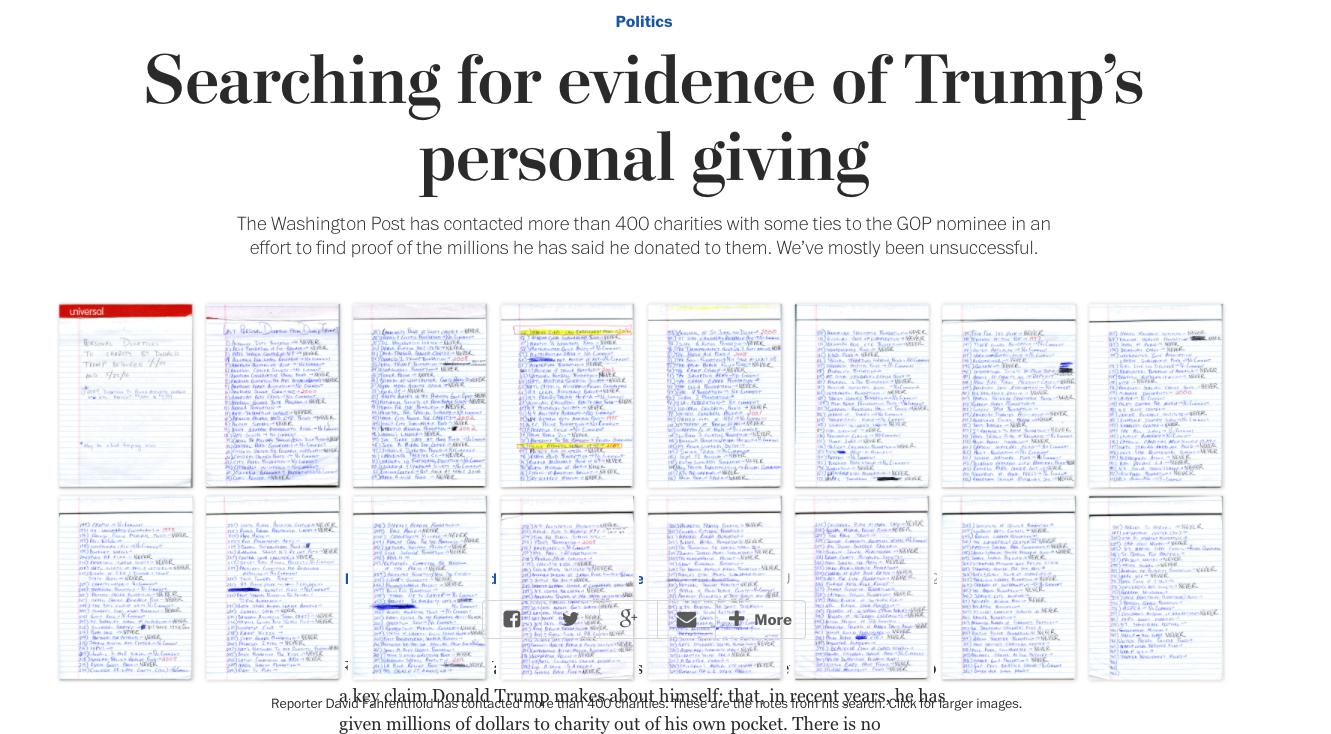Project: Systematic Systemic Stories¶
Attention
- Slugline
- None. Delivery won’t take place over a single-email
- Due
- 2017-12-12 23:59
- Description
- A group project (can be of various sizes) in which we work collaboratively on a single issue and in collecting information, data, and records from public entities, to better understand and explain the issue and, if necessary, to hold institutions accountable.
Background¶
Collaborative journalism is not just a hot trend, but something made possible through technology and Internet connectivity. I’ve always wanted to do a data project but it’s difficult to balance that kind of wide-ranging work with the focused technical component of this class.
It’s tempting to join an ongoing national data project such as Documenting Hate, Fatal Encounters, and TrumpWorld. Even if it ends up being data entry, it’s good real-world experience with just how difficult data entry (and coordination) can be, and how mundane data eventually becomes powerful evidence in a published story.
That’s still a possibility (though I think it’s better if students pursue it on their own time). What I’m hoping we do in the mid-weeks of this course is come up with an public affairs issue that we can cover locally, and then expand to county, region, state, national.
It doesn’t have to be something with an initially hard-hitting goal. It can have the goal of explaining how things are. The idea doesn’t have to be “new” either, but riff off an already successful story, similar to how news outlets nationwide followed the lead of a Florida newspaper’s lottery investigation and replicated it nationwide:
A nationwide reporting adventure tracks improbably frequent lottery winners
Intrigued, we wanted to chart new territory: to find out whether these repeat winning patterns exist across the country. We decided to submit public records requests in every state with a lottery—an adventure in itself given that FOIA laws vary significantly by state. In all, we sent more than 100 public record requests to lotteries for information about their winners, game odds, and investigative reports. Getting those records wasn’t simple, as we outline below.
In fact, it’s not an exaggeration to say that being late to the game and copying someone else’s idea can still win you Pulitzers. Fatal Encounters cared about police-involved shootings long before the nation was shocked by Ferguson. The Guardian and the Washington Post launched their own iterations; the WaPo won the Pulitzer. The Guardian, because of how they decided to count things, produced groundbreaking work in examining Taser deaths.
And just a few weeks ago, Reuters produced its own wide-scale investigation into Taser deaths nationwide, finding even more fatalities than even Amnesty International.
Unlike most other work in this class, there won’t be a deliverable, i.e. a hastily written 1200-word story – although iterative publications, like David Fahrenthold’s notepad tweeting, is a possibility:

Even though it’s “old”, Fahrenthold’s notepad of Trump’s philanthropy is one of the finest examples of data journalism today, including how it has scaled into something bigger:
https://www.washingtonpost.com/graphics/politics/2016-election/trump-charity-donations/

It’s unrealistic to expect that we as a class could complete an in-depth project on top of everything else required of you academically. Instead, the main goal of this project is to produce experience – additional experience in public records, in understanding local government, in doing on-the-ground reporting. Skills and experiences that when I talk to recruiters, I can refer to specifically.
If we plan this project properly as a collaborative, scalable project, there’s no reason why it can’t be easily carried into the next quarter to be something you build off of in the winter and spring, or expand to include more people.
TK: Examples of things I like and don’t like